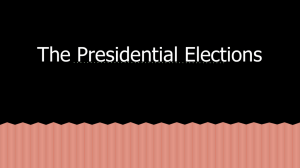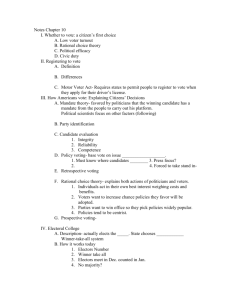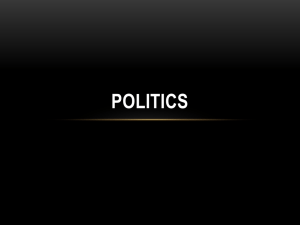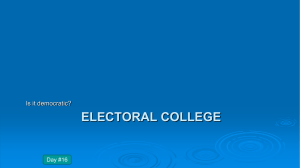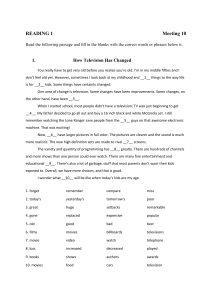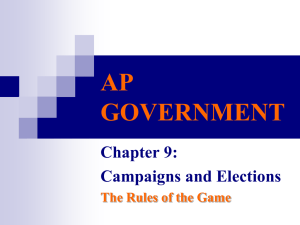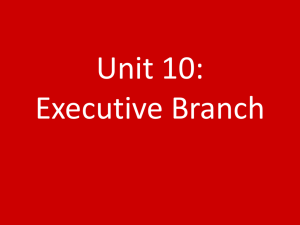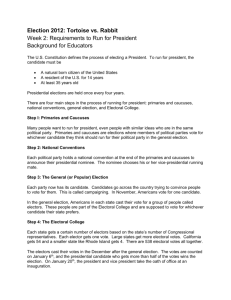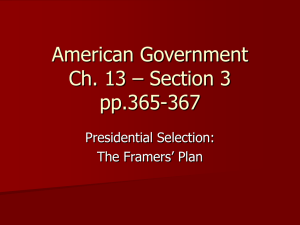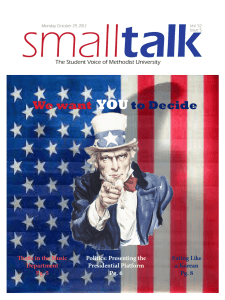1a.RootsElections.Running.Combined
advertisement
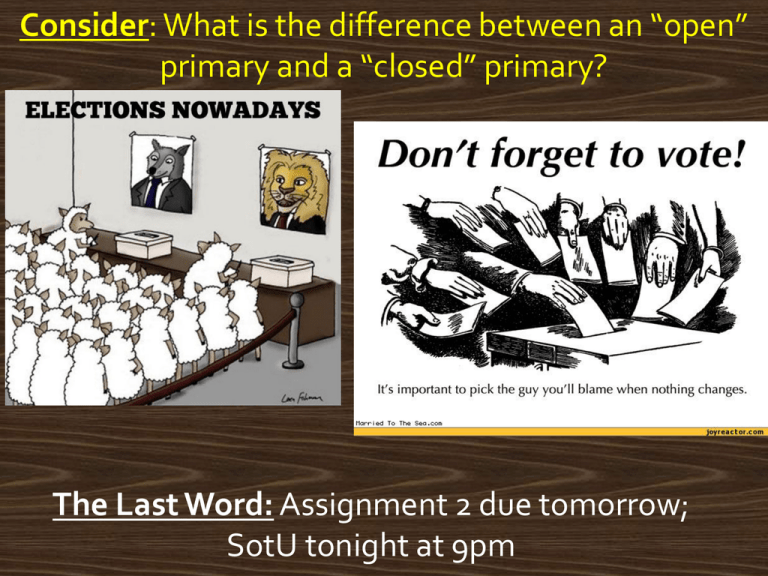
Consider: What is the difference between an “open” primary and a “closed” primary? The Last Word: Assignment 2 due tomorrow; SotU tonight at 9pm AP Government and Politics Unit 3b Why are they held on the first Tuesday after the first Monday in November? Constitution did not establish date; states were free for a while to hold them whenever Congress sets date in 1845 *Primary dates still determined by states (parties) Types of Elections Primary Elections ▪ Closed Primaries ▪ Open Primaries – crossover voting ▪ Runoff primary General Election Ballot Measures Initiative – voters initiate Referendum – legislatures refer Recall election What are some of the positive aspects of allowing ballot initiatives and referendums? What are some of the negatives? 12.2 Methods to select delegates Winner-take-all primary – Republicans Proportional representation primary – Democrats **Not exclusively, but mostly by each side Caucuses – Iowa most notable Frontloading Why might some states want to move the date of their primary forward? March 1st (SUPER TUESDAY)- primaries in… AL, GA, MA, OK, TN, TX, VT, VA **April 26th – Pennsylvania primary June 7th – California, Montana, New Jersey, New Mexico, South Dakota Same group/time as 2012 Final Primary - June 28th – Utah “Trump ahead, followed by a bowl of spaghetti.” Consider: Why do we have the Electoral College? The Last Word: Assignment 3 due Friday AP Government and Politics Unit 3 Voters go to the polls and choose their favorite candidate for president (and VP) The winner of the popular vote gets (most of the time) all of their party’s electors chosen to cast the allimportant “Electoral Votes” ▪ These chosen electors from all 50 states are considered “the Electoral College”, though they never meet together in one place. These Electoral Votes are the votes that determine who wins the presidency. ▪ 270 will win Who selects the Electors? ▪ The process is determined by states. Generally, the political parties nominate Electors at their State party conventions. Each candidate will have their own unique slate of potential Electors as a result of this part of the selection process. Electors are often chosen to recognize service and dedication to their political party. They may be State-elected officials, party leaders, or persons who have a personal or political affiliation with the Presidential candidate. Are there restrictions on who the Electors can vote for? There is no Constitutional provision or Federal law that requires Electors to vote according to the results of the popular vote in their States. Some States, however, require Electors to cast their votes according to the popular vote. Federalism Lack of knowledge Framers belief that voters would not know enough about national candidates, and may only vote for regional/local candidates Communication, Transportation, Information There was also a belief that the use of the EC would lead to no single candidate winning a majority of EV’s; thus no candidate could claim a “nationwide mandate” ▪ the House would frequently decide the winner (not an altogether bad proposition for some Framers, but could lead to divisiveness…) What are the consequences, both good and bad, of using this system? How is voting power apportioned in the EC? 12.2 Consider: Do you believe the Electoral College should be reformed? The Last Word: Assignment 3 due Friday Popular vote winner can lose the election What reform would solve this problem? Blue wins fewer (but larger) states by a large margin Red wins more (but smaller) states by a small margin States with small populations are overrepresented “weight” of Wyoming voter = .0000058 “weight” of California voter =.0000015 Reform? EVs given to each state based entirely on population ▪ For example, 1 EV for every 500,000 people ▪ Or, simply don’t give any for the Senate ▪ Or could award EV’s based on who wins in each Congressional House district Winner-Take-All method ignores losing voters What reform might address this problem? States with laws AGAINST faithless electors “Faithless electors” Reform? – Hands = visit by McCain or Obama Dollar = $1 million spent on TV commercials **Notice the states that were visited the most, and had the most money spent for TV time Another issue would be that candidates can avoid “safe” states that they “know” they will win or lose.. Attention on “early states” and “swing states” only 2016 “Super-swingy” states – NV, CO, IA, OH, VA, FL, and IA/NH Vote yes or no Discuss your reasons why, including reform(s) you would support. If not, discuss the dangers of using certain reforms Consider: How are congressional elections different from the presidential election? The Last Word: Assignment 4 due Monday; optional WQ Congressional races are different from Prez races in several ways Prez races are more competitive, last longer Turnout lower in midterms ▪ But change often appeals to voters MoCs can help constituents in ways president cannot MoCs can “run against DC” – how is this possible? ▪ Despite “outsider” claims of 2016 candidates, Prez often is national official MoCs sometimes enjoy protection/insulated from party of president ▪ Coattail effect has lessened as people vote split ticket more often ▪ This also illustrates weakening effects of party 12.3 Staff Support Directly or indirectly support incumbent through constituent service Visibility Name recognition Easy access to local media Generous travel allowances Scare-off effect Challengers shy away from incumbent’s institutional advantage 12.3 Redistricting Can punish incumbents in the out-of-power party (at the state level) Scandals Sexual improprieties or other offenses Presidential Coattails Incumbent presidential election loss can trickle down Mid-Term Elections Threaten incumbents of president’s party How does the president affect congressional elections?

